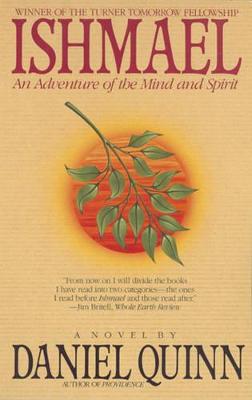
One of the most beloved and bestselling novels of spiritual adventure ever published, Ishmael has earned a passionate following among readers and critics alike. This special twenty-fifth anniversary edition features a new foreword and afterword by the author, as well as an excerpt from My Ishmael.
TEACHER SEEKS PUPIL.
Must have an earnest desire to save the world. Apply in person.
It was just a three-line ad in the personals section, but it launched the adventure of a lifetime.
So begins an utterly unique and captivating novel. In Ishmael, which received the Turner Tomorrow Fellowship for the best work of fiction offering positive solutions to global problems, Daniel Quinn parses humanity’s origins and its relationship with nature, in search of an answer to this challenging question: How can we save the world from ourselves?
Praise for Ishmael
“As suspenseful, inventive, and socially urgent as any fiction or nonfiction you are likely to read this or any other year.”—The Austin Chronicle
“Before we’re halfway through this slim book . . . we’re in [Daniel Quinn’s] grip, we want Ishmael to teach us how to save the planet from ourselves. We want to change our lives.”—The Washington Post
“Arthur Koestler, in an essay in which he wondered whether mankind would go the way of the dinosaur, formulated what he called the Dinosaur’s Prayer: ‘Lord, a little more time!’ Ishmael does its bit to answer that prayer and may just possibly have bought us all a little more time.”—Los Angeles Times
I found this slight. interesting but slight. While some points are valid (aka our cultural structure and social structure is broken but we have too much invested in it for an easy fix) some are quite invalid. Yes, we need to stop having so many children *but* we can't just starve people because there's a famine in their country. The English tried that in Ireland, it was referred to as Laisse Faire Economics. Millions of Irish people died or fled the country, while there was enough foodstuffs being produced in some areas, but they were being exported for profit. Also profiteers robbed people blind. That's what happens when people prey on people.
Also animals don't just kill enough to satisfy themselves, ask a sheep farmer about dog packs or a person with hens about foxes, then come back to me about animals being perfectly in balance with each other. This is a fallacy as dangerous as the noble savage concept.
While the author presents the idea that there is no "one true way" or "one truth" the book is absolutist, offering a concept that agriculture is wrong and that the one true way is hunter-gatherer. Some of the theories say that the only reason we developed education and other concepts like that was because that due to agriculture you could support people who would teach and would do other things rather than work on the farm, that it gave people time.
What the world needs is more balance. While I do agree that the Western European or "mother culture" as depected in the book is broken, and needs fixing, I don't think this is the cure.
Worth reading mindfully for the ideas, I disagreed with much of them, but found myself thinking, which rose the book above the original 3 stars to 3.5 stars.
Reading updates
-
Started reading
-
19 March, 2013:
Finished reading
-
19 March, 2013:
Reviewed
